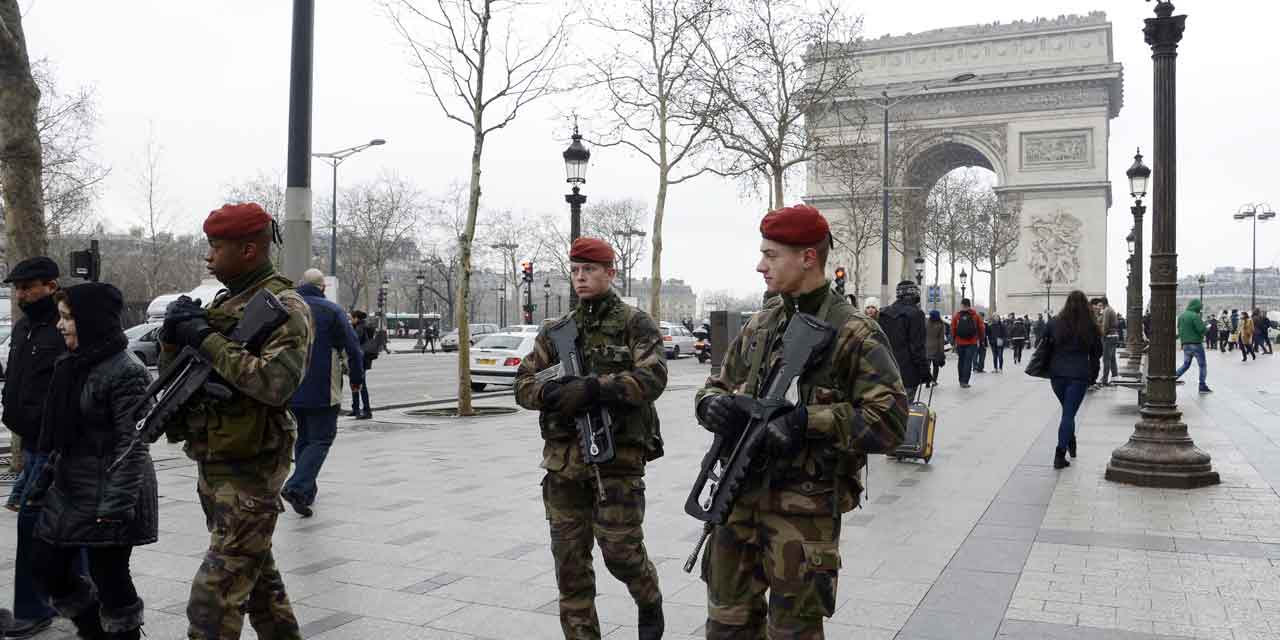By Erika Koutroumpa,
The terrorist attacks in 2015 and 2016 were a turning for French society and the government’s policy, with perhaps the most significant being in the sector of national security. In 2016, new legislation was enacted which oversaw the revision of plan Vigipirate to be able to adapt to a higher level of danger. Now, half a decade since their revision the measures are still in force, a staple in French daily life.
The vigipirate plan is a permanent means of preventing and remaining alert under the threat of a terrorist attack. Created in 1978, it was triggered for the first time in 1991 with the Gulf War, the intention was to be a temporary measure. Since then, it has de facto been integrated into France’s national security policy for the last 25 years, or so. Depending on the severity of the threat, multiple measures are enforced, aiming toward public security by incentivizing all relevant parties: the government, the provinces, the businesses, and the citizens. Includes around 300 measures, most are triggered when the situation is dire and are divided into 3 levels of threat. This includes emergency plans at both domestic and international levels, with national plans aiming towards facilitating the collaboration between state authorities for the protection of the citizens

The vigipirate plan is simply a manifestation of the change in priorities of the French government. The Livre blanc series was the first national security strategy book that began in the 1950s, the latest written in 1994. In the past, these focused on the impact of globalization and dealing with potential nuclear threats. The revival of the livre blanc occurred after 9/11, in 2007 with the foundation of the white paper commission under the presidency of Sarközy, which focused on widening the security spectrum past the domestic level, accounting for the European security program. The 2008 version of the white book included opinions of think tanks and the public, which signified a new era for the french national security plans. This time, the strategy shifted less towards nuclear security and more towards adopting a new culture of national security to account for threats in an era of globalization. The first goal now is to defend the French population and national territory, emphasizing the principles of democracy, personal freedoms, equality, and justice.
The Île-de-France attacks of 2015 were simply the catalyst for massive change in the French defense plans, making them more in line with the 2008 livre blanc policy. Instead of focusing on expanding the territories, the aim is to find a more sustainable equilibrium between intervention efforts abroad and homeland security operations. In 2017, 7,000-10,000 soldiers were deployed to combat internal threats, almost just as many as the 10,000 deployed abroad to tackle jihadist threats. At the time of the Charlie Hebdo attacks, there were massive protests demanding that the government make more efforts toward counter-terrorism. While the requests of the French citizens had been heard, the biggest issue the government ran into was that the armed forces lacked staff after the budgetary cuts in the early 2010s. People allocated towards vigipirate rose from 1,000 to 7,000 right after the attacks, causing the need for an organizational shift within the French forces.
Around the same time, France established its own FBI and CIA equivalents and passed a law in 2015 that it is now illegal for French citizens to leave the country to participate in terrorist organizations. Right after the Charlie Hebdo attacks, Jean-Yves Le Drian, former minister of defense stated that the vigipirate plan cost France around 1 million euros per day, and in 2016 alone 30 million euros were allocated towards security measures in universities, including guards at the entrances and bag checks for all visitors.

The vigipirate plan might be a staple of the current French defense policy and everyday life, but it is considered a point of controversy. There has been a decline in terrorism in the West which coincided with the COVID-19 pandemic. Restrictions on freedom of movement, public gatherings, travel, and an immediate threat to personal health may help explain the fall. In 2021, deaths from terrorism fell by 1.2% to 7.142, while attacks rose by 17%, highlighting that terrorism is becoming less lethal. Currently, France is ranked 35th on the global terrorism index for 2022, which is a lower position compared to the past and as of 2023, the restrictions in place by the plan have been relaxed. Nevertheless, the effectiveness of the vigipirate plan is considered dubious, with some people even alleging that it is merely a political tool, while it has also been criticized by French intellectuals for trespassing on the right to privacy due to the constant surveillance in place.
To sum up, the vigipirate plan is an integral part of the french national defense system. Though it has been faced with criticism, one cannot help but acknowledge the significant role it has played in restructuring the armed forces and foreign affairs policy of the country. France’s new emphasis on combatting terrorism while trying to maintain a balance between international relations and domestic safety has entered its final stage thanks to the opportunity provided by the 2015 attacks. While the plan’s efficiency is yet to be estimated, one thing seems to be sure; these vigilance measures are here to stay.
References
-
Adaptation de la posture Vigipirate “Eté – Automne 2022 : sécurité renforcée – risque attentat”, 21 June 2022. seine-maritime.gouv.fr. Available here
-
Comprendre le plan vigipirate. gouvernement.fr. Available here
- “Vigipirate, France’s ‘temporary’ anti-terror plan celebrates 20th birthday”, 8 September 2015, Tony Cross, RFI. rfi.fr. Available here
-
Terrorisme et vigilance: le point sur le “plan vigipirate”, Sebastien Demichel, 1 February 2022, Vigilanz Kulturen – LMU Munchen. vigilanz.hypotheses.org. Available here
-
Global Terrorism Index 2022: Key findings in 6 Charts. isdglobal.org. Available here




